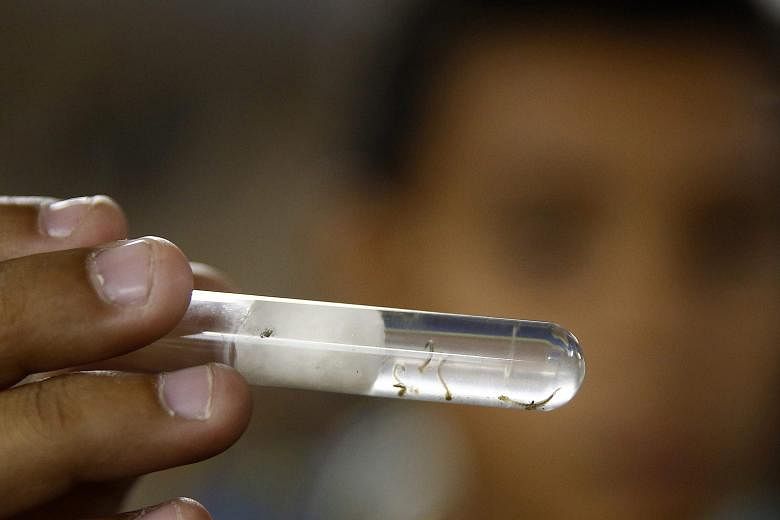NEW YORK • The global public health emergency involving deformed babies emerged last year, the hottest year on record, with an outbreak in Brazil of a disease transmitted by heat-loving mosquitoes. Can that be a coincidence?
Scientists say it will take them years to figure that out, and pointed to other factors that may have played a larger role in starting the crisis. But these same experts added that the Zika epidemic, as well as the related spread of dengue that is sickening as many as 100 million people a year and killing thousands, should be interpreted as warnings.
Over the coming decades, global warming is likely to increase the range of the particular mosquitoes carrying these viruses and speed up their life cycle, encouraging their spread deeper into temperate countries like the United States.
Recent research suggests that under a worst-case scenario, involving continued high global emissions and fast population growth, the number of people exposed to the principal mosquito could more than double - to as many as 8 billion or 9 billion by late this century from roughly 4 billion today.
Several experts said in interviews that a main reason for the disease outbreaks is most likely the expansion of the number of people at risk, through urbanisation, population growth and international travel. They see the changing climate as just another stress on top of a situation that is already rife with peril.
While they do not understand to what degree rising temperatures and other weather shifts may have contributed to the outbreaks, they do understand some of the potential mechanisms.
The mosquitoes mostly live on flower nectar, but the female of the species needs a meal of human blood to have enough protein to lay her eggs. If she bites a person infected with dengue, Zika or any of several other diseases, she picks up the virus.
The virus has to reproduce in the mosquito for a certain period before it can be transmitted to another person in a subsequent bite. The higher the air temperature, the shorter that incubation period.
Moreover, up to a point, higher temperatures cause the mosquitoes to mature faster.
"You are actually speeding up the whole reproductive cycle of the mosquitoes," said Dr Charles Beard, who heads a unit studying insect-borne diseases for the United States Centres for Disease Control and Prevention, on the effect of rising temperatures. "You get larger populations, with more generations of mosquitoes, in a warmer, wetter climate. You have this kind of amplification of the risk."
The World Bank is setting aside US$150 million (S$211 million) to help Latin American and Caribbean nations cope with the hit to their economies from the Zika virus.
The Washington-based development lender said it is prepared to increase support if additional financing is needed. Some countries that are highly dependent on tourism, especially in the Caribbean, may suffer losses exceeding 1 per cent of gross domestic product (GDP), and the hit to the region is estimated at about US$3.5 billion of GDP this year, the bank said.
The World Bank said its financing will support activities, including surveillance and control, identification of people most at risk, follow-up and care of patients, and promoting access to family planning.
The World Bank's move follows the Feb 1 declaration by the World Health Organisation (WHO) that the Zika outbreak and its potential association with birth defects in South and Central America are an international public health emergency. The WHO has estimated that there could be 3 million to 4 million cases of the virus in Latin America, and the travel industry is starting to feel the effects of customers who are changing plans.
Top US and Brazilian medical experts met on Thursday to launch a research partnership to find a vaccine against Zika, which has spread rapidly since it first appeared in the Americas last year.
Brazilian Health Minister Marcelo Castro said the experts will also pool resources and knowledge during the two-day meeting to develop better methods to test people for Zika and ways to eradicate the mosquito that spreads the virus.
NEW YORK TIMES, BLOOMBERG, REUTERS

